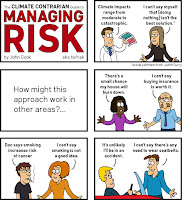In Business Insider, Josh Barro recently wrote about the former:
Trump calls for a huge risk premium because, while he probably wouldn’t be a disastrous president, the low-probability disasters that he might cause would be immensely costly. Some of them involve nuclear weapons and global mass deaths. Pricing those risks in properly should push his share price comfortably below Clinton’s, even if you think she is very bad.In most cases, Americans are good at managing risks. We buy insurance for our homes, cars, and health. We wear seat belts in cars, and far fewer Americans smoke today than just a few decades ago.
The smoking analogy is particularly apt. In the mid-20th century, scientists were just beginning to make the connection between smoking and lung cancer, and over 40% of Americans smoked cigarettes in the 1960s. Today, Americans are aware of the risks associated with smoking, and the number has dropped below 17%.
The structures of the risks themselves are similar. Each time we smoke, we slightly increase the risks of a catastrophic outcome (developing lung cancer). Each time we burn fossil fuels, we slightly increase the risks of irreversible and potentially catastrophic climate change impacts. To mitigate those risks, we need to smoke as little and burn as little fossil fuels as possible.
Americans have been successful in the former case, but we’re struggling with the latter. Our carbon pollution has started to decline, and the Obama Administration has made great progress in tackling climate change. But Donald Trump has explicitly threatened to reverse that progress, and 40% of Americans don’t seem to care.
The threat of catastrophic climate change isn’t as tangible as a burning house, car accident, or lung cancer. Americans tend to view climate threats as distant in both time and space. According to research by scientists from Yale and Utah State University, 55% believe that global warming won’t harm them personally, and just 51% think that it will harm Americans. 61% believe that global warming will harm future generations. In other words, Americans don’t think global warming is a problem now, and not much of a threat where they live.
The good news is that Americans do support solutions to the climate problem. 74% favor regulating carbon as a pollutant, as the Obama Administration is trying to do. The bad news is that because they see it as a distant threat, they view these solutions as a low priority, and hence politicians like Donald Trump can threaten to obstruct them without losing voter support.
Read more at Trump and Global Warming: Americans Are Failing Risk Management

No comments:
Post a Comment